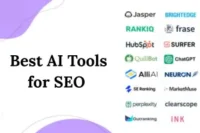The Role of AI in SEO: Future-Proof Your Digital Strategy
Published: 20 Oct 2025
In today’s digital environment, search engine optimization (SEO) includes more than just keywords and backlinks. Artificial intelligence (AI) is transforming how firms handle SEO, making it smarter, quicker, and more efficient. From evaluating user behavior to predicting the most effective keywords, AI empowers marketers to make data-driven decisions that enhance website rankings.
Understanding the role of AI in SEO is crucial if you want your website to consistently rank at the top of search results. In this post, we’ll look at how AI is revolutionizing SEO methods, the benefits it delivers, the problems to watch out for, and how you can use it to improve your online presence.
What is AI in SEO?
Artificial intelligence (AI) in SEO refers to the application of modern technology to improve search engine optimization tactics. Instead of depending solely on manual analysis, AI technologies can evaluate massive volumes of data, identify patterns, and recommend the most effective steps for improving website rankings. AI assists marketers in understanding user behavior by assessing how users interact with a website, optimizing content by identifying high-performing subjects and keywords, and automating repetitive chores like tracking backlinks or inspecting websites.
It may also predict changes in search engine algorithms and upcoming trends, allowing firms to respond rapidly. Understanding the impact of AI in SEO enables marketers to make more informed, data-driven decisions that increase online exposure and keep their websites competitive.
How AI is Changing SEO
Artificial Intelligence is transforming SEO by making strategies smarter, faster, and more effective. To understand this better, you can also explore the advantages and disadvantages of AI and see how these factors impact SEO performance.
- Material Creation: Artificial intelligence systems refine material, propose revisions, and produce drafts that match search intent.
- Keyword Research: Artificial intelligence predicts high-impact phrases, allowing you to target traffic-generating terms.
- Voice Search Optimization: Artificial intelligence (AI) understands natural language inquiries, which improves voice search results.
- Search Engine Algorithms: AI-powered algorithms assess content quality, relevancy, and user experience more efficiently.
- User Experience and Personalization: AI makes individualized content recommendations to keep visitors engaged.
Advantages of AI in SEO
Artificial Intelligence is transforming SEO by making strategies smarter, faster, and more effective. Here are the key advantages of using AI in SEO:
1. Saves Time on Repetitive Tasks
AI can handle tasks like monitoring website rankings, auditing pages, checking backlinks, and analyzing traffic patterns automatically. By automating these time-consuming processes, marketers can spend more time on strategy, creativity, and improving the overall SEO plan rather than on manual work.
2. Smarter Keyword Research
AI uses massive datasets to choose the most successful terms based on search trends, competition, and user intent. This guarantees that advertisers target the correct demographic, generate more relevant traffic, and enhance the likelihood of greater conversions without wasting time on ineffective keywords.
3. Better Content Optimization
AI may analyze your material and recommend changes to headers, meta descriptions, keyword placement, and structure. It also helps produce ideas that fit what consumers are looking for, ensuring that your content is relevant, entertaining, and more likely to rank higher in search engines.
4. Enhanced User Experience
AI may monitor visitor activity and offer tailored information, making surfing easier and more entertaining. AI reduces bounce rates, increases session duration, and improves user happiness by delivering the appropriate information to the right person at the right time.
5. Data-Driven Decisions
AI generates useful insights by evaluating massive amounts of data that would be hard to interpret manually. Marketers may utilize this information to make better decisions regarding content strategy, SEO strategies, and website enhancements, resulting in more successful and quantifiable outcomes.
6. Stay Ahead of Competitors
AI can track changes in search engine algorithms, forecast upcoming trends, and detect holes in rival strategy. Businesses that use AI can respond swiftly to changes, optimize quickly than rivals, and retain a strong presence in search engine results.
Disadvantages of AI in SEO
While AI offers many benefits for SEO, it also comes with challenges that businesses should consider before fully depending on it. Here are the main disadvantages of using AI in SEO:
1. Lack of Human Creativity
AI can create and optimize material, but it frequently lacks the originality, emotional depth, and storytelling talent that human authors possess. Overuse of AI-generated content may result in websites that seem artificial and fail to connect with genuine visitors.
2. Risk of Over-Reliance
Relying too much on AI technologies might impede critical thinking and human judgment. Marketers may blindly adopt AI advice without considering brand voice, context, or audience demands, perhaps harming SEO in the long term.
3. Algorithm Limitations
AI works based on the data it’s trained on, which means it can sometimes give inaccurate results. If the data is incomplete or biased, AI-generated insights may mislead marketers and hurt SEO strategies.
4. Data Privacy Concerns
Many AI tools collect and analyze user data. If not handled responsibly, this could raise privacy issues and lead to compliance problems with laws like GDPR or other data protection regulations.
5. High Costs for Advanced Tools
Powerful AI-driven SEO tools sometimes have significant membership fees. Small firms and novices may struggle to purchase these tools, making it more difficult for them to compete with larger organizations.
6. Lack of Contextual Understanding
AI can evaluate keywords and patterns, but it can not always recognize cultural subtleties, slang, or language distinctions. This can have an impact on the effectiveness and relevancy of SEO efforts for a wide range of audiences.
Future of AI in SEO
The future of SEO will be forever connected with artificial intelligence. As search engines grow more intelligent, businesses will need to modify their tactics to remain competitive. Here is what the future of AI in SEO looks like:
1. More Accurate Search Predictions
AI will improve its ability to guess what people want before they write a query. This implies that SEO will focus on understanding the purpose and providing highly focused content that meets user demands.
2. Growth of Voice and Visual Search
With the emergence of smart speakers, voice search is getting more popular, and AI is driving this trend. Similarly, AI-powered visual search will enable users to locate items and information by submitting photographs, making SEO optimization more difficult and entertaining.
3. Deeper Personalization
AI will enhance customization by displaying users’ search results and website content that is tailored to their interests and behavior. Businesses that employ AI for customisation are likely to see increased engagement and conversions.
4. Stronger Role in Content Creation
AI technologies will develop in their ability to generate material that not only matches keywords but also adjusts to tone, style, and context. However, human control will continue to be necessary to ensure that material is original and trustworthy.
5. Predictive SEO Strategies
AI will help businesses plan by predicting upcoming search trends and user behavior. This means companies can optimize content before competitors catch on, gaining an early advantage in rankings
6. Integration with Emerging Technologies
AI in SEO will expand into areas like Augmented Reality (AR) and Virtual Reality (VR), making search more interactive. Businesses that adapt early to these technologies will set themselves apart in the digital space.
How Businesses Can Leverage AI in SEO
AI is changing the way businesses do SEO. It makes the process faster, smarter, and more accurate. Here are some ways businesses can use AI for better SEO results:
1. Advanced Keyword Research
AI technologies can process vast volumes of data in seconds. They identify popular keywords, long-tail phrases, and user intent. This enables firms to target the appropriate audience and rank higher.
2. Smart Content Creation
AI may propose themes, generate outlines, and optimize material for SEO. It also tests for grammar, readability, and keyword density. This assures high-quality material that search engines value.
3. Voice Search Optimization
Voice searches are increasing rapidly. AI enables firms to develop content for natural speech inquiries. This increases the odds of ranking for voice-based searches.
4. Predicting User Behavior
AI studies user patterns and predicts what people want. Businesses can use this to deliver personalized content, improve engagement, and boost conversions.
5. Automating Technical SEO
AI-powered tools fix issues like slow speed, broken links, and missing tags. This keeps websites healthy and improves ranking without manual work.
6. Local SEO Improvement
AI helps businesses optimize for local searches. It can analyze trends and suggest ways to rank in local results and Google Maps.
7. Competitor Analysis
AI tools track competitor strategies, backlinks, and rankings. Businesses can use this data to stay ahead and make better decisions.
Conclusion
AI is playing an increasingly important role in SEO, and it is transforming the way firms approach digital marketing. AI is more than simply a tool; it is a game-changer. From discovering the perfect keywords and developing high-quality content to analyzing user behavior and improving technical components, AI accelerates, smartens, and improves everything.
If you want to keep ahead of your rivals, you should start using AI in your SEO approach. Businesses that implement AI now will dominate search rankings tomorrow. Don’t wait for the future; it’s already arrived.
Are you ready to take your SEO to the next level? Start utilizing AI-powered tools today and observe how they improve the speed of your website!
Frequently Asked Questions (FAQs)
Got questions about AI in SEO? Here are some common questions and clear answers to help you understand better:
The purpose of AI in SEO is to make search optimization smarter, quicker, and more accurate. It assists with keyword research, content production, user intent analysis, voice search optimization, and technical SEO.
AI solutions simplify activities, enhance decision-making, and provide tailored experiences, hence increasing website rankings and traffic.
In SEO, humans are in charge of strategy, creativity, and decision-making, whereas AI is responsible for automation and data analysis. AI assists with keyword research, technical audits, and content optimization, whilst humans concentrate on developing compelling content, building links, and understanding user emotions. Together, they improve SEO effectiveness.
AI is used for keyword analysis, generating SEO-friendly content, checking technical issues, and predicting search trends. It saves time and improves accuracy.
No, artificial intelligence cannot replace SEO expertise. It assists them by automating jobs and delivering insights, while people undertake strategic and creative work.
AI saves time, improves accuracy, and helps create personalized content. It also makes keyword research and technical optimization easier.

- Be Respectful
- Stay Relevant
- Stay Positive
- True Feedback
- Encourage Discussion
- Avoid Spamming
- No Fake News
- Don't Copy-Paste
- No Personal Attacks

- Be Respectful
- Stay Relevant
- Stay Positive
- True Feedback
- Encourage Discussion
- Avoid Spamming
- No Fake News
- Don't Copy-Paste
- No Personal Attacks





